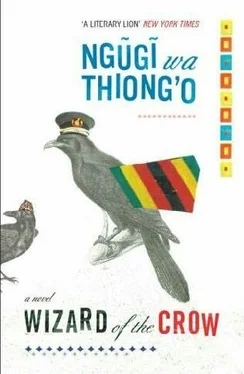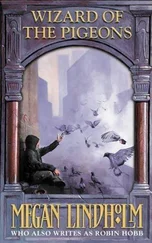She went so far as to consider finding Nyawlra’s whereabouts and turning her in, to her husband’s advantage. But opportunity knocked. Her husband had asked her to look for a sorcerer to heal the Wizard of the Crow. Who could do that better than the other Wizard of the Crow? She would help Nyawlra, and Nyawlra would help her. Then she would betray her, or rather let Tajirika do it, and that way Tajirika would rise in the government and might even succeed the Buler. Her husband would be bound to her in eternal gratitude.
The following morning Tajirika rushed to the State House to confer with the Buler. And on the next Sunday Vinjinia rushed to All Saints to see Maritha and Mariko.
The news came from the State House through Big Ben Mambo, Minister of Information, and it was broadcast by all the media. The Buler had devised a philosophy that would cure the people of the stresses of modernity. The government printer even issued a booklet: Magnus Africanus: Prolegomenon to Future Happiness, by the Ruler. The book said, among other things, that during his retreat and meditation it had been revealed to the Buler that the real threat to Aburlria’s future lay in people’s abandoning their traditions in pursuit of a stressful modernity.
And so, according to the teachings of Magnus Africanus, children and youth, even those at the university, must seek out and follow the advice of adults, and when they fail to do so they must be caned on their bare buttocks. Women must get circumcised and show submission by always walking a few steps behind their men. Polygamous households should not form queues. Instead of screaming when they are beaten, women should sing songs of praise to those who beat them and even organize festivals to celebrate wife beating in honor of manhood. Most important, all Aburlrians should remember at all times that the Ruler was husband number one, and so he was duty bound to set an example by doing in the country what individual men were to do in their households. The government would distribute the booklet free through churches, mosques, temples, and schools. Television and radio stations would be required to feature an excerpt daily, as a thought of the day. Teachers would be strongly encouraged to impart to schoolchildren the virtues of the past, of unquestioning obedience. Instead of using the word past, they would talk about African modernity through the ages, and they should talk of the leading figures in Africa’s march backward to the roots of an authentic unchanging past as the great sages of African modernity.
On the very day of the publication of Magnus Africanus, the Ruler issued a special decree that traditional African healers would no longer be called sorcerers, diviners, or witch doctors. Henceforth they would be called specialists in African psychiatry, in short, afrochiatrists, and they would be allowed to call themselves Doctor. The Ruler was making plans to set up the Ruler’s Academy of Authentic Afrochiatrists.
But the most dramatic in a week of dramatic statements was to follow soon, and it instantly became the subject of gossip, rumor, and speculation in every home in every village in every corner of Aburlria. The Ruler announced that all those who wanted to become the founding doctors of the new academy must present themselves at the State House for a national test. The very best among the founding doctors of the academy would comprise the Ruler’s advisory council to advise the Ruler on how best to ensure that people’s heads were on straight-behind the Ruler’s thought. The test would be given on the basis of first come, first tested.
Nothing like this had ever been seen or heard of in Aburfria: experts in sorcery and witchcraft, with their paraphernalia, winding their way to the State House to take the first-ever national achievement test in their trade. The sheer number who came forward was astounding. Some were among the most regular attendants at mosques and churches; nobody would ever have suspected these zealots of ever practicing sorcery and witchcraft on the side. There were a few others who knew nothing about sorcery and witchcraft but nevertheless came forward, hoping somehow to pass the test and earn a place in the Ruler’s advisory council as a base for personal advancement. Some had traveled at night, and by the early hours of the appointed day there was already a queue visible by even those at some distance from the gates of the State House.
Ever vigilant of opportunities to capture Satan, the Soldiers of Christ stood watching, but they were puzzled by the momentous proceedings. They were not alone in being puzzled by this gathering, for there were only two people, the Ruler and Tajirika, who knew the purpose of the national achievement test in sorcery and witchcraft.
An assistant for protocol fetched sorcerer or witch doctor in front of the queue and led him or her to a waiting room, from where Njoya, Kahiga, or A.G., depending on who happened to be guarding the door, escorted him or her to the testing site.
The test itself was simple. Each competitor would try to cure a man afflicted with a malady of words causing words to become stuck in his larynx. None was told the name or other details about the sick man; none knew that the patient was the Wizard of the Crow.
Kamltl had heard Njoya and Kahiga whisper about the impending arrival of a delegation of afrochiatrists to the State House. He gleaned that these were leading African specialists in mental disorders. But he did not know that they were coming up to see him.
Many of the sorcerers went through identical preliminaries: they would do some acrobatics, some even blowing horns or whistles to unsettle the evil spirits that possessed the patient, and then would venture a question to which Kamltl always responded by spitting out the word: if. They all left the room defeated, muttering to themselves that they had never encountered a case of so complete a possession by bad spirits. Some tried to cover their failure by saying that they were going for stronger medicines, that they would surely come back, but there was very little enthusiasm and conviction in their voices.
Kamltl began to feel good about his own performance. It was difficult even for the most astute of doctors to diagnose an illness in which the patient was silent about symptoms. But after dismissing one after the other, he came across one afrochiatrist who terrified him to the core.
This master surgeon started by elaborating on his experience, as if offering his credentials to the two examiners in the room.
“I tell you, it is not just one or two on whom I have operated and removed bits of iron buried deep in their bellies or their joints-their knees, for instance,” he said, confiding in Njoya and Kahiga. “I have operated on many, and seven out of every ten have come out of it alive and well. Not bad, eh? And I do it swiftly,” he added, reaching for the surgical tools in his bag and carefully spreading them on the floor.
Kamltl counted hammers, tweezers, miniature saws, razor blades, needles, knives, scissors, and nails of different sizes and shapes. He did not know what was more terrifying, the array of surgical tools or the master surgeon’s matter-of-fact tone in talking about his past successes.
Kamltl decided to take matters into his own hands. He stood up, walked toward the surgeon, barking, IF! IF! and spraying saliva in the direction of his nemesis, who was counting the tools. The master surgeon imagined that Kamltl intended to infect him and his tools with evil, and started collecting his paraphernalia and putting them back into the bag. It was too late. His gadgets were slimy with spit. A glob attached itself to his face; the surgeon did not wait for more. He let out an involuntary scream, threw the last of his gadgets into the bag, dashed out of the room, and ran as fast as his jingled legs could carry him toward the gates of the State House, moaning loudly for all the world to hear that his things had been bewitched with saliva. Me, too, he added, moaning, “I have just been cursed.” In his frenzy, he felt death knocking at his door. “I am going to die” soon changed into “I am dying,” and by the time the master surgeon had reached the queue outside, the cry had become “I am dead.” When asked by the others what was the matter, he blabbered about his bewitchment and certain death.
Читать дальше












